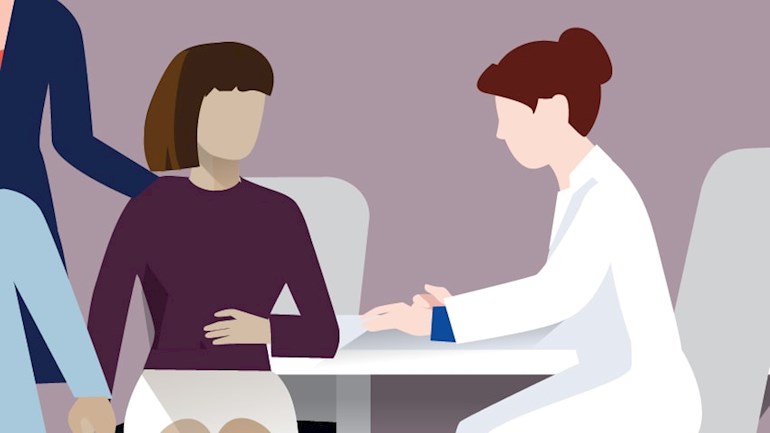Did you involve your spouse, family, or friends in navigating your treatment options? Why or why not? If not, in what other ways did your circle help to support you?
"When a woman walks into an oncologist’s office, she’s usually not alone. In fact, a new study finds that half of women have at least three people standing behind them, sitting next to them or waiting at home to help face cancer.
In most cases, these support people are going with the patient to appointments, taking notes, finding additional resources and helping talk through treatment options.
“People just diagnosed with cancer are often scared and overwhelmed. Having another person to help them process information is important,” says Lauren P. Wallner, Ph.D., MPH, assistant professor of general medicine and epidemiology at the University of Michigan. Wallner is the lead author of the paper, published in the journal Cancer.
“Physicians need to recognize that women involve other people in their treatment decisions. These people represent an important group to provide treatment information to,” Wallner notes.
The study surveyed 2,502 women with early stage breast cancer about two months after they had surgery. Women were asked to list specific individuals who were involved in helping them make a treatment decision.
Half of the respondents listed at least three people and 20 percent listed two people. Only 10 percent said they had no personal decision support network. Nearly three-quarters of women said their support network talked with them about their treatment options and frequently attended their appointments.
African-American and Latina women reported larger networks than white women. Women who were married or partnered also reported more support.
Even among women without a partner or spouse, many had large support networks. Women reported children, friends, siblings, parents and other relatives as involved in decision-making.
“Minority women tend to have larger networks, so clinicians should also be aware that there could be differences in the number of people patients might be involving. And these networks go beyond just a partner or spouse,” Wallner says.
Larger support networks were associated with more deliberation about treatment, which the researchers suggest could be critical as treatment options become more complex. More deliberation suggests patients are thinking through pros and cons, discussing it with others and weighing the decision carefully.
“When patients are diagnosed with cancer, there’s this rush to get through the treatment process. But for patients with early stage breast cancer, they have some time to decide on their treatment choice,” Wallner says.
“The idea that women are discussing their options more with their family and friends and potentially thinking through that decision more carefully is reassuring. Engaging these informal support networks could be a way to prevent women from rushing into something,” she says.
The researchers recommend physicians incorporate family and friends into the conversation, delivering information and decision aids to everyone in the room, as well as providing information that can be shared with those back at home.
Typically, decision aids and other materials are written for the patient. Wallner says this study suggests the need to broaden these materials to include family and friends who play a role in helping a woman understand her treatment choices.
“When considering these complex treatment options and going through these complex decisions, it’s beneficial to have the support of other people. This helps women feel supported in their decisions,” Wallner says.
At the same time, women without a support network may need extra help or information during the decision process, Wallner points out.
“It starts with something as simple as physicians asking patients who is helping them make their treatment decisions. That can then guide the conversation, such as the amount of resources the physician provides and to whom they communicate that information,” she says."
